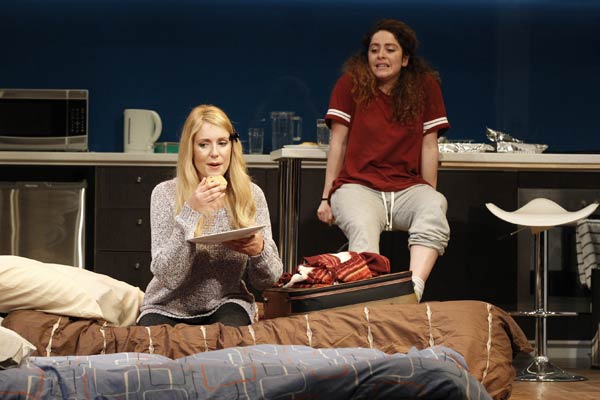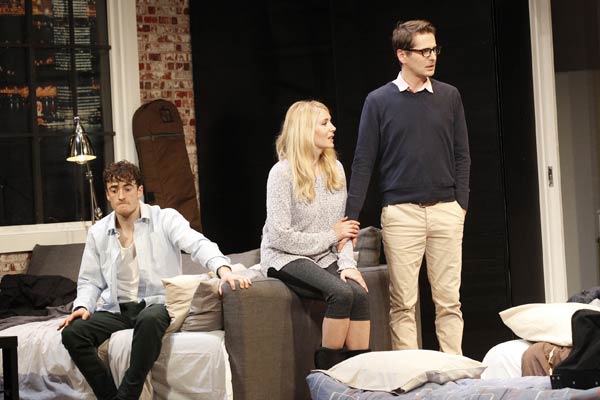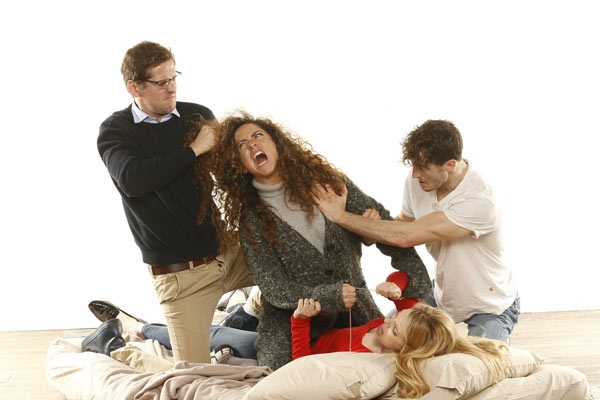'Bad Jews' is a controversial title for a fairly controversial comedy: Sourced from Josh Harmon (the playwright) and friends' description of themselves, "an insider's name for the less observant", it opens up the question of what makes a good or bad Jew, or indeed a good or bad person.
The play predictably contains Jewish humour about Jewish families. It is set in a New York apartment where three cousins come together after their Grandfather's funeral: Daphna, a committed Jewess, and two more casually Jewish brothers, Jonah and Liam (the eldest, who arrives late from a ski trip with his girlfriend). But does it compute for Goys?
 Image © Jeff Busby
Image © Jeff BusbyProducer Aleksandar Vass asserts "the universal theme of family dysfunction makes the play accessible to anyone" and that is true to a large extent. He also comments that the character of Daphna is "nasty and likeable all at the same time" but in fact the likeable drops off fairly fast, as her manoeuvring between being coercive and affronted reveals that her gushing friendliness is limited by her religious or personal aims. Non-Jewish sympathy for Daphna is pretty limited, and the play doesn't paint modern Jews or Judaism in a great light.
It's a witty play with some great lines and amusing character traits; but overall it's more alarming than amusing to witness how religion is used to justify bigoted attitudes and personal attacks. Particularly so because Jonah and Liam don't call it: although they don't encourage Daphna, or subscribe to her attitudes, there is a sense that they must tolerate her sentiments, that this superiority is just part of Judaism. Liam can't stand her, but this seems more about her ability to Lord it over him in family religious brownie points than any philosophical response against her attitude. Liam does highlight the selective nature of Daphna's Judaism, just as she notes he's happy to identify as a Jew when it gives him intellectual authority. Daphna however is sharp enough to point out that her cousins want people like her to keep up the tradition for them.
It's complicated, and this comedy asks big questions such as how to maintain cultural heritage in a multi-cultural world. Do all races and creeds that seek to preserve their identity necessarily become insular and prejudiced? Is the alternative worse?
 Image © Jeff Busby
Image © Jeff BusbyThe cast did a great job but the main characters are too stereotypical: the hung-up Jewish-background academic and the fierce born-again Jewess. Melody, the girlfriend, is not brainy but is redeemed by being gentle and kind, rising above the abuse she overhears to beg for universal civility, and stepping up to her boyfriend to demand he listens to the woman who abused her (knowing that Daphna was aware that she would overhear). However her simple kindness is ultimately undermined for laughs - a dramatic mistake and disconcerting given that she is the only non-Jewish character. It's notable that the one time the cousins have fun together, laughing at a childhood memory of their grandfather, she is kept out in the cold; and perhaps half of the audience with her. The only redemption seems to stem from the lampooned outsider, and lies in Liam's love for Melody: he is inspired by her compassionate approach to everyone.
Perhaps this is a brave and honest look at religion and families, but it's a grim comedy with some uncomfortable undertones.
★★★☆☆






